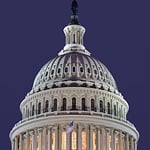Report from Washington, D.C.
December Activities on Capitol Hill
Written by: developer
Dec. 2: House and Senate Armed Services leadership reached an agreement on the National Defense Authorization Act (NDAA) for FY 2015 (S. 1847). This annual bill funds the Department of Defense (DoD), including key military space and cyber-security programs. The bill:
- Instructs the Secretary of Defense to submit a report assessing the ability of the DoD to deter and defeat any act of space aggression by an adversary. The People’s Republic of China and the Russian Federation are specifically named in the bill text.
- Instructs the DoD to develop an American-made, next-generation rocket propulsion system, to be developed no later than 2019, for purposes of transitioning from the use of non-allied space launch engines for national security space launches.
- Prevents the DoD from contracting with launch companies that utilize Russian engines, and includes a waiver process.
- Instructs that the U.S. Air Force shall open a competitive bidding process for an additional launch in 2015, and one other between 2015 and 2017.
- Requires the Secretary of Defense to direct the Defense Science Board to conduct a study assessing current and projected future needs for ground and space sensor infrastructure for space situational awareness.
- Sets a requirement for educating all officers and enlisted military personnel on cyber-security matters.
- Requires the President to submit a report annually through the year 2020 to Congress on foreign economic and industrial espionage in cyberspace during the 12-month period preceding its submission.
 Dec. 10: After the success of Orion EFT-1, the House Science, Space, & Technology Committee’s Space Subcommittee held a hearing titled “An Update on the Space Launch System and Orion: Monitoring the Development of the Nation’s Deep Space Exploration Capabilities.” While Orion and Space Launch System (SLS) continue to enjoy mostly bipartisan support, the programs still face schedule and budget challenges that all concerned agree need to be diligently managed. Additionally, after the initial two Orion-SLS test flights occur, what missions that will occur afterwards need to be identified and planned for.
Dec. 10: After the success of Orion EFT-1, the House Science, Space, & Technology Committee’s Space Subcommittee held a hearing titled “An Update on the Space Launch System and Orion: Monitoring the Development of the Nation’s Deep Space Exploration Capabilities.” While Orion and Space Launch System (SLS) continue to enjoy mostly bipartisan support, the programs still face schedule and budget challenges that all concerned agree need to be diligently managed. Additionally, after the initial two Orion-SLS test flights occur, what missions that will occur afterwards need to be identified and planned for.
Dec. 13: In an atypical Saturday session, the Senate closed out the 113th Congress by passing a $1.1 trillion Omnibus Appropriations Bill for FY 2015 (H.R. 83). Highlights from the bill include:
- National Aeronautics and Space Administration (NASA) received $18 billion, a $364 million increase above FY 2014 funding, with $4.4 billion earmarked to keep Orion/SLS on schedule.
- National Oceanic and Atmospheric Administration (NOAA) received $5.4 billion, a $126 million above FY 2014.
- National Science Foundation (NSF) received $7.3 billion, a $172 million increase above FY 2014.
This article is part of Space Watch: January 2015 (Volume: 14, Issue: 1).
